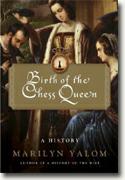Marilyn Yalom
book reviews:
· general fiction
· chick lit/romance
· sci-fi/fantasy
· graphic novels
· nonfiction
· audio books
· author interviews
· children's books @
curledupkids.com
· DVD reviews @
curledupdvd.com
newsletter
win books
buy online
links
home
for authors
& publishers
for reviewers

 |
Birth of the Chess Queen: A History Marilyn Yalom HarperCollins Hardcover 304 pages April 2004 |
|
It is perhaps no accident that the chess queen was granted full range of movement, making her the most powerful piece on the board, during the reign of Isabella of Spain, who routed the Moors and banished the Jews. The man who wrote the manual granting the chess queen her new freedom was the son of a well-placed official who had written in open flattery of Isabella, "When the queen studies, we all study." Arguably, Columbus won his spurious titles - admiral and viceroy - because of a chess game: Ferdinand won, and in a generous mood said yes to the self-seeking request of this annoying man who, for some reason, had won his wife's favor.
We recall that Lewis Carroll's Alice had to cross the landscape laid out in checkered squares to change her lowly status as pawn to that of queen. In doing so she had to gain control of or willingly learn from notably chess-like characters, the allegory made all the more obvious by Tenniel's brilliant illustrations. The author suggested through the symbolism of chess that there was a perilous, madcap journey from childhood to adulthood to which his young "pawn" would be subjected. This would have been easy reading for a child of Dr. Dodgson's times, though one doubts if today the story would have much relevance, because modern children don't play chess, indeed may never see a chess set unless they are raised in exceptional families. There was an era, however, when chess was as popular as television. Invented in India in the fifth century, it was the popular game of royalty and soon spread outward to the common man. Since Islam forbids representation of the human form, chess pieces developed as bizarre symbols, adding to the mysterious aspect of this most intellectual of pastimes. Translated into Christian symbology, the "bishop" became a mitre, the "knight" a charging horse, and the queen, of course, was represented by a modest crown on a slender pillar. Playing chess was forbidden by tyrants and religious fanatics; it is notable that after the recent liberation of Afghanistan from the rule of the Taliban, "the first objects to be taken out of hiding were radios, musical instruments, and chess sets." The book is filled with illustrations including color photos of chess pieces, depicting the queen as majestic, warlike, even untouchably holy like the queen of heaven. Yalom, a senior scholar at the Institute for Women and Gender at Stanford University, has written previously about the arcana of women's lives - A History of the Wife, A History of the Breast. In this work she presents the simple fact that though the great queens of Western civilization have been chess strategists, employing the rules of engagement on the board for both dynastic and romantic ends, there are at this time no great women players. Chess, as a women's game, has fallen out of social fashion, and the famous modern players are men who scorn the notion of women rising to prominence in the competitive chess world. In fact, the book issues a challenge. Perhaps the chess queen should become the "personal emblem" of powerful and power-hungry women: "Long live the queen!" © 2004 by Barbara Bamberger Scott for Curled Up With a Good Book |
|
|
|
 Click here to learn more about this month's sponsor! |
|
| fiction · sf/f · comic books · nonfiction · audio newsletter · free book contest · buy books online review index · links · · authors & publishers reviewers |
|
| site by ELBO Computing Resources, Inc. | |
 This is one of many well-researched vignettes in Marilyn Yalom's thoughtful account of the game of chess from a women's perspective. And not just any women - female monarchs in the game of life, playing the game and using the strategy of the game to advance across the board of life. In the beginning, chess had no queen - she was added after a scant five hundred years had passed, and by Isabella's time had gained the supremacy of motion and importance on the board that modern players are accustomed to.
This is one of many well-researched vignettes in Marilyn Yalom's thoughtful account of the game of chess from a women's perspective. And not just any women - female monarchs in the game of life, playing the game and using the strategy of the game to advance across the board of life. In the beginning, chess had no queen - she was added after a scant five hundred years had passed, and by Isabella's time had gained the supremacy of motion and importance on the board that modern players are accustomed to.